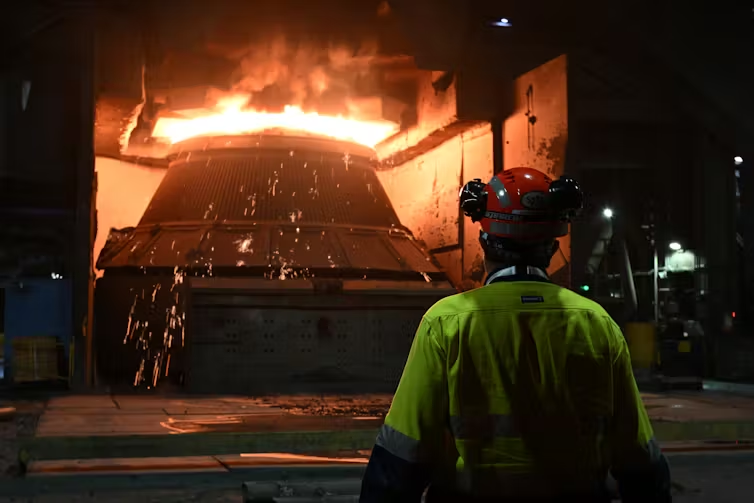When Finance Minister Jim Chalmers visits Beijing later this month, he and his counterpart at China’s top economic body, the National Development and Reform Commission, will have no shortage of important topics to discuss.
Mr Chalmers will attend the Australia-China Strategic Economic Dialogue, part of the tripartite agreement secured by the Gillard government in 2013.
The aim was to hold annual talks at the highest level. The agreement also includes a summit dialogue and a diplomatic and strategic dialogue involving the foreign ministers of the two countries.
Challenging times
The dialogue was last held in September 2017, when official relations between the two countries began to deteriorate.
It was then formally suspended by Beijing in May 2021 after the Morrison government scrapped a memorandum of understanding with the Victorian state government on joining China’s Belt and Road Initiative.
The revival of dialogue has been slow – a stabilisation of bilateral relations under the Albanese government has already seen reciprocal visits by heads of state and foreign ministers – but it was only in June that the two sides signed a new memorandum of understanding to resume dialogue.
The fact that Foreign Minister Chalmers was able to confirm the visit last Sunday is further evidence that Canberra and Beijing remain committed to discussions, despite the many issues over which the two countries are at odds.
Chalmers’ concerns
A top priority for the Treasurer will be to get first-hand insight into China’s struggling economy and the risks it poses to Australia’s own prospects.
In announcing the visit, he referred to one scenario his ministry is tracking, which he said could see a $4.5 billion hit to federal budget revenues due to falling prices for key exports such as iron ore and lithium.
Slowing Chinese growth and falling commodity prices are clearly not good for Australian incomes, but Chalmers is unlikely to come back in a panic.
China continues to import record or near-record amounts of Australian iron ore and lithium, according to the latest trade figures.

Dean Ruins/AAP
This suggests that increased supply and lack of demand from other countries are at least as relevant in explaining the recent price declines, and both have come out of abnormal price spikes and are now approaching levels closer to their historical averages.
The impact of China’s growth on demand for Australian goods and services has also never been, and still is, a simple one-to-one relationship.
A complex relationship
Australian wine exports, for example, have soared since Beijing lifted tariffs earlier this year.
Chinese customs officials estimated the value of Australian wine imported in the past three months at US$252 million (about A$400 million), more than the A$357 million sold to the United States, Australia’s second-largest customer, in the past year.
International students from China are also enrolling in Australian universities in record numbers, but numbers are likely to fall next year due to restrictions imposed by Canberra rather than Beijing.
That China remains the preeminent market is underscored by the large number of businesses and politicians attending the Australia-China Business Council’s Canberra networking day on Thursday, with speeches from Trade Minister Don Farrell, Foreign Minister Penny Wong, Shadow Trade Minister Kevin Hogan and Shadow Foreign Minister Simon Birmingham due to take part.
Chalmers is also keen to address the lingering import ban that Beijing imposed on Australian lobster in 2020. Trade Minister Don Farrell said in June he was “very confident” the ban would be lifted “in the near future.” Chalmers’ visit could be an opportunity to announce a final solution.
China’s Concerns
For China, the biggest concern will be how Australia will treat Chinese investors, particularly in areas such as critical minerals, which have been welcoming in the past but appear to be effectively barring further engagement after 2020.
A recent survey of Chinese companies in Australia revealed generally positive sentiment: Around 80% said they were optimistic about the prospects for the local business environment. Still, 72.5% said they had never experienced discriminatory treatment, while 42.4% felt there was a lack of transparency in the enforcement of Australian laws and regulations.
It’s easy to see why: When asked in an interview last Sunday whether he would like to see “Chinese investment in Australian critical minerals processing”, Chalmers didn’t say “no” – he didn’t even say a qualified “yes”.
China will also want assurances that the Australian government will not join Washington and other capitals typically seen as “like-minded” geopolitically in imposing tariff barriers on Chinese imports.
That reassurance shouldn’t be hard for Chalmers. Unlike the United States, Australia’s economic relationship with China remains overwhelmingly complementary: Australian exports to China last year exceeded imports by $110.7 billion.
And with the rising cost of living and the move to net zero, low-cost, high-quality imports from China, such as electric vehicles, will be welcomed by the government.
Late last month, Australia’s Minister for Climate and Energy Chris Bowen hosted his Chinese counterpart at the eighth Australia-China Climate Change Ministerial Dialogue in Sydney.
A bipartisan approach
Trade with China also enjoys bipartisan support, with Minister Farrell touting in March the possibility of increasing two-way trade to between $300 billion and $400 billion.
Not to be outdone, Opposition Leader Peter Dutton said in June that “trade relations are [with China] “Two-fold increase”
Foreign Minister Chalmers was right when he said this week that Australia’s relationship with China is now “one that is both complex and full of opportunity”, and his visit should help manage the former and realise the latter.
#Understanding #risks #Australia #slowing #Chinese #economy #Chalmers #top #priority #upcoming #Beijing #talks